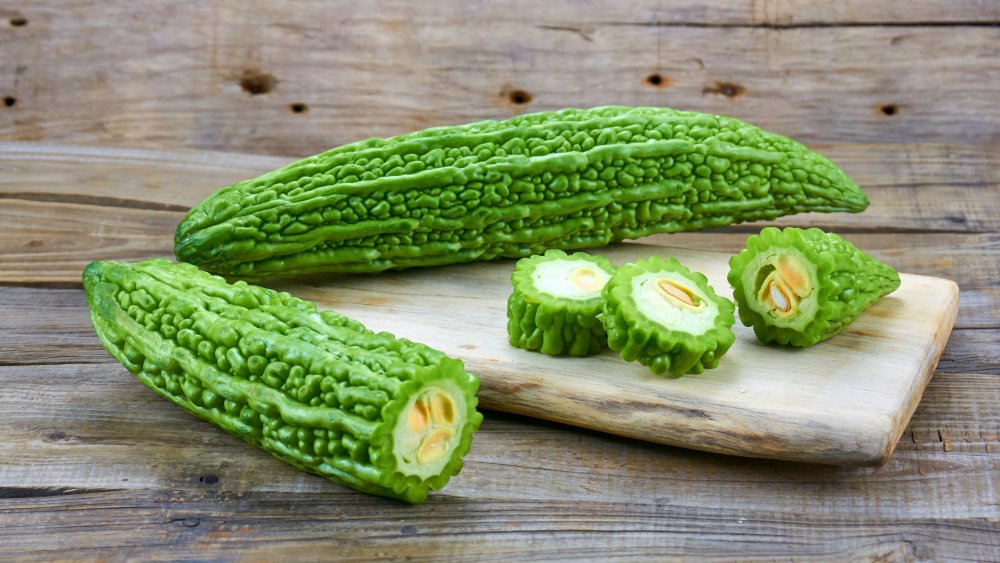What Is Bitter Melon And What Does It Taste Like?
It's known by many names: bitter gourd, bitter squash, kerala, balsam pear, and goya. And like its cousin, the cucumber, the bitter melon is a gourd that comes from the cucurbitaceae family and shares a family tree with melons, pumpkins, squash, and courgettes. But perhaps unlike its cousins, the bitter melon is ugly. And even though it is watery like the cucumber and can be eaten raw (via The Kitchn), it may be good to give this way of eating a bitter melon a hard pass as it truly lives up to its name (via Food Republic).
The bitter melon grows on vines and loves tropical and subtropical weather, and is most commonly found in Southeast Asia, Africa, and China. Cooks that swear by bitter melon normally try to deal with its strong, distinctive flavor by salting it, then preparing it as part of a stew, curry, or stir fry with other flavors and spices. Pooja Makhijani writes for Paste Magazine, "Bitter melon has a crunchy husk, like a green pepper, and a watery texture, like a cucumber. But it's weedy, alkaline taste is unlike any other like fruit or vegetable." She explains that cooking it tames those flavors, but that bitter melon has an "unmistakable astringent flavor."
Bitter melon may be bitter, but its also very good for you
The bitter melon is more than a divisive gourd that people either love or hate, though. Its unpleasant flavor means that it is also full of a compound known as cucurbitacins, which are indeed very bitter, but are also very beneficial to health. "It has long been believed that bitter melon has cleansing powers and improves the blood, and others promote it as a cure for diabetes," Jennifer McLagan, author of Bitter: A Taste of the World's Most Dangerous Flavor tells Food Republic. "Research shows that it is good for lowering blood sugar levels and fighting viruses, and a study at the University of Colorado Cancer Center showed that bitter melon juice kills cancer cells."
And it's healthy, too. One serving of bitter melon, which is about 94 grams, contains 20 calories, 4 grams of carbohydrate, 2 grams of fiber, a whopping 93 percent of RDI of vitamin C, and 44 percent of RDI of vitamin A, along with trace amounts of folate, potassium, zinc, and iron. But while bitter melon looks like a wonder food, you can also have too much of a good thing; people who have eaten too much of the gourd have suffered diarrhea, vomiting, and stomach pains. Also, bitter melon has been shown to affect blood sugar in some way, making it a food — and supplement — that is probably best enjoyed in large quantities on the advice of a healthcare professional (via Healthline).

